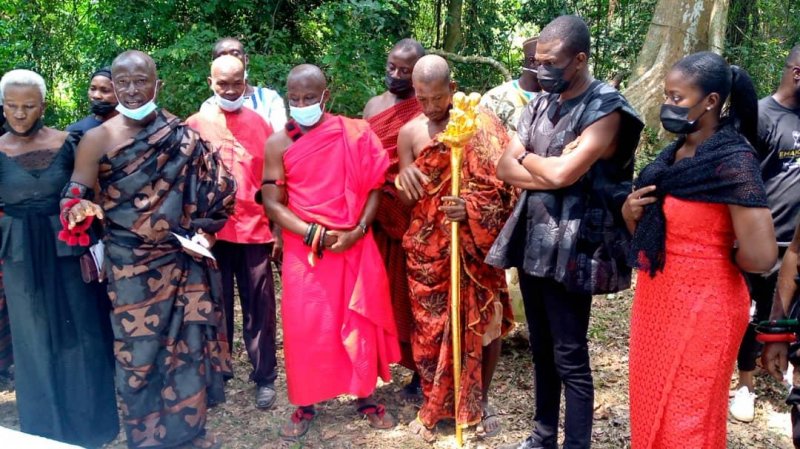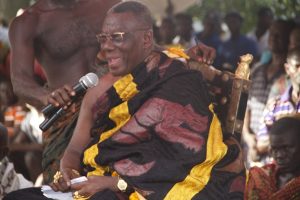Mr. Mark Okraku Mantey, Deputy Minister for Tourism, Arts and Culture has challenged stakeholders in the industry to double their efforts and work hand-in-hand with the government to change the face of tourism in the Central Region.
He said with the enormous tourism potentials and its high propensity to accelerate economic growth, it behooved all to rake in their unalloyed support to collectively develop the Region for mutual gains.
“Let love ourselves and work in unity for development because when we depended on others, we had mass burial and enslavement of human dignity,” the Minister appealed.
Mr. Mantey was speaking at a durbar to commemorate the “Crossing of River Pra” by slaves during the trans-Atlantic slave trade as part of activities to mark this year’s Emancipation Day celebration at Assin-Parso on Thursday. The Assin-Praso Historical Heritage Village is home to many historical relics including amour rooms, mass graveyard, white cemetery, historic bamboo Flora, slaves sorting centre the slave river-‘nnonko suo’, and a crossing path of the slaves which is still visible. Wreaths were laid on behalf of the government and the people of Ghana, traditional rulers, the global African community, and the youth of Africa while mediation, reflection, and healing prayers were said at the riverside.
The celebration, which was under the Panafest theme: “Securing the African family: Our health, our wealth, our soul,” and Emancipation Day theme “Reclaiming our right to weave our narrative”, brought together Government officials, chiefs, and Africans from the Diaspora.
It was in tandem with the “Beyond the Return” initiative succeeding the “Year of Return” by the Government of Ghana not only to promote tourism and homecoming of Africans and Ghanaians in the diaspora but to foster economic relations and investments in Ghana.
Emancipation Day Celebration is an annual event observed to commemorate the resistance and liberation of African people in the Diaspora against enslavement and violation of their human rights.
The climax of the celebrations is held on August 1, each year, with a grand durbar of Chiefs at Assin-Manso in the Assin South District to mark the abolition of slavery in the British colonies in 1834.
The Deputy Minister regretted chattel slavery, which saw the brutal treatment of Africans who were captured as slaves from their homeland and transported through the ‘door of no return’ in the various Castles to the Americas and the Caribean.
He commended the traditional authorities for their efforts to revolutionize sustainable tourism practice in the area to feed into the overall gamut of the Ministry’s ambition to make the Tourism, Arts and Culture industry the number one contributor to Gross Domestic Product (GDP) while creating new jobs.
Seeing the uniqueness of the historical enclave for the first time, Mr. Mantey said the diverse cultures, arts, vast and suitable landscape, as well as a reservoir of warm and hospitable people, were necessary ingredients in the tourism menu that needed to be explored not only for tourism development but any other industrial developments.
He reiterated the government’s commitment to ensuring that as many Africans in the Diaspora, returned ‘home’ and reunite with their ‘families’ and contribute to the developmental process of Africa.
Nana Awodo Aseku X, Chief of Assin-Prado/Jakai called on the Government and stakeholders to collaborate to develop the Assin-Praso Historical Heritage Village (HHV) into an ultra-modern tourist’s site.
That was the way to maintain and prevent the country’s historical heritage from cultural adulteration and historical misinformation to inculcate the spirit of patriotism, nationalism, and selflessness among the citizenry.
Additionally, it would promote national unity, peace, and harmony in diversity to eliminate all forms of racial or ethnic discrimination to enhance human dignity and create sustainable jobs for the teeming unemployed youth in the area.
The Paramount Chief indicated that the story of the inhumane act of the trans-Atlantic slave trade cannot be told without recourse to Assin-Praso which was a transit or resting place for the whites.
“Assin-Praso was resting and a meeting place where the whites met before transiting to or from the northern or southern part of Ghana. People from Mali, Sierra Leone, Burkina, Nigeria were brought here for war during the anglo-Ashanti wars.
“We have relics of their armory, castles, mass graveyard for blacks and white cemetery, historic bamboo plantation, and the resting place of the famous Yaa Asantewa before she was sent to the Elmina Castle,” the Omanhene said.
The Omanhene wondered why the site had been neglected by the government and appealed to all to support to redeem Ghana’s historical heritage to foster unity and cohesion to spark development.
Source: GNA











